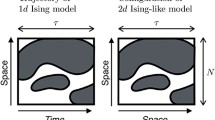Abstract
Augmented infinitesimal perturbation analysis (APA) was introduced by Gaivoronski [1991] to increase the purview of the theory of Infinitesimal Perturbation Analysis (IPA). In reference [Gaivoronski 1991] it is shown that an unbiased estimate for the gradient of a class of performance measures of DEDS represented bygeneralized semi-Markov processes (GSMPs) (cf. [Glynn 1989] can be expressed as a sum of an IPA-estimate and a term that takes into account the event order changes. In this paper we present an alternate approach to establishing the result of Gaivoronski, and from this we derive a necessary and sufficient condition for the validity of the IPA algorithm for this class of performance measures. Finally we validate our results by simulation examples.
Similar content being viewed by others
References
Brémaud, P., and Gong. W.B., 1991. Derivatives of likelihood ratios and smoothed perturbation analysis for the routing problem. Technical Report, INRIA-Sophia Antipolis, No. 1495, France.
Brémaud, P., and Vázquez-Abad, F.J., 1991. On the pathwise computation of derivatives with respect to the rate of a point processes: The Phantom RPA method.QUESTA:1–10.
Cao, X.R., 1985. Convergence of parameter sensitivity estimates in a stochastic experiment.IEEE Trans. Automatic Control, 30(9):834–843.
Cao, X.R., 1987. Sensitivity estimates based on one realization of stochastic system.J. Statist. Comput. Simulation, 27:211–232.
Cao, X.R., 1988. On a sample performance function of Jackson queueing networks.Oper. Res., 36:128–136.
Cao, X.R., and Ho, Y.C., 1987. Estimating sojourn time sensitivity in queueing networks using perturbation analysis.J. Optim. Theory Appl., 53:353–375.
Fu, M.C., and Hu, J.Q., 1991. On choosing the characterization for smoothed perturbation analysis.IEEE Trans. Automatic Control, 36(11):1331–1136.
Gaivoronski, A.A., 1991. Perturbation analysis and optimization of general discrete event dynamic systems using augmented IPA estimates: Part I.IEEE Trans. Automatic Control.
Glasserman, P., 1988a.Equivalence Methods in the perturbation Analysis of Queueing Networks. Ph.D. thesis, Division of Applied Sciences, Harvard University.
Glasserman, P., 1988b. Infinitesimal perturbation analysis of a birth-death process.OR Lett. 7:43–49.
Glasserman, P., 1991.Gradient Estimation Techniques for Discrete Event systems. Boston: Kluwer.
Glasserman, P., and Gong, W.B., 1990. Smoothed perturbation analysis for a class of discrete-event systems.IEEE Trans. Automatic Control, 35(11):1218–1230.
Glasserman, P., and Yao, D.D., 1991. Algebraic structure of some stochastic discrete event systems, with applications.Discrete Event Dynamic Syst., 1(1):7–35.
Glasserman, P., and Yao, D.D., 1992a. Generalized semi-Markov processes: Antimatroid structure and second-order properties.Math. Oper. Res.
Glasserman, P., and Yao, D.D., 1992b. Monotonicity in generalized semi-Markov processes.Math. Oper. Res.
Glynn, P.W., 1989. A GSMP formalism for discrete event systems.Proc. IEEE, 77(1):14–23.
Gong, W.B., 1987.Smoothed Perturbation Analysis of Discrete Event Dynamic Systems. Ph.D. thesis, Division of Applied Sciences, Harvard University.
Gong, W.B., Cassandras, C., and Pan, J., 1991. Perturbation analysis of a multiclass queueing system with admission control.IEEE Trans. Automatic Control, 36(6):707–723.
Gong, W.B., and Ho, Y.C., 1987. Smoothed (conditional) perturbation analysis of discrete event dynamic systems.IEEE Trans. Automatic Control, AC-32(10):858–866.
Heidelberger, P., Cao, X.R., Zazanis, M.A., and Suri, R., 1988. Convergence properties of infinitesimal perturbation analysis estimates.Management Sci., 34:1281–1302.
Ho, Y.C., and Cao, X.R., 1991.Perturbation Analysis of Discrete Event Dynamic Systems. Boston: Kluwer.
Ho, Y.C., and Cao, X.R., 1985. Performance sensitivity to routing changes in queueing networks and flexible manufacturing systems using perturbation analysis.IEEE J. Robotics Automation, RA-1(4):165–172.
Hu, J.Q., and Ho, Y.C., 1990. An infinitesimal perturbation analysis algorithm for a multiclass G/G/1 queue.OR Lett., 9:35–44.
Keilson, J., 1979.Markov Chain Models—Rarity and Exponentiality. New York: Springer-Verlag.
Law, A.M., and Kelton, W.D., 1991.Simulation Modeling and Analysis. New York: McGraw-Hill.
Lewis, H.R., and Papadimitriou, C.H., 1981.Elements of the Theory of Computation. Englewood Cliffs, NJ: Prentice-Hall.
Shi, L.Y., 1991. Discontinuous perturbation analysis of discrete event dynamic systems.IEEE Trans. Automatic Control.
Shi, L.Y., 1992.Optimization of Discrete Event Dyanmic Systems. Ph.D. thesis, Division of Applied Sciences, Harvard University.
Sreenivas, R.S., and Krogh, B.H., 1991. On Condition/Event systems with discrete state realizations.Discrete Event Dynamic Syst., 1:209–236.
Suri, R., 1989. Perturbation analysis: The state of the art and research issues explained via the GI/G/1 queue.Proc. IEEE, 77(1):114–137.
Vakili, P., and Ho, Y.C., 1989. Alternative representation and perturbation analysis in a routing problem.Proc. 28th IEEE Conf. Decision and Control: 1082–1083.
Wardi, Y., 1988. Interchangeability of expectation and differentiation of waiting times in GI/G/1 queues. Technical report, School of Electrical Engineering, Georgia Institute of Technology.
Zazanis, M.A., 1986.Statistical Properties of Perturbation Analysis Estimates for Discrete Event Systems. Ph.D. thesis, Division of Applied Sciences, Harvard University.
Author information
Authors and Affiliations
Additional information
This research was supported by the National Science Foundation under grant number ECS-85-15449, Office of Naval Research Grants Nos. N00014-90-K-1093 and N00014-89-J-1023 and by Army Grant No. DAAL-03-86-K-0171.
Rights and permissions
About this article
Cite this article
Gaivoronski, A.A., Shi, L.Y. & Sreenivas, R.S. Augmented infinitesimal perturbation analysis: An alternate explanation. Discrete Event Dyn Syst 2, 121–138 (1992). https://doi.org/10.1007/BF01797724
Issue Date:
DOI: https://doi.org/10.1007/BF01797724




